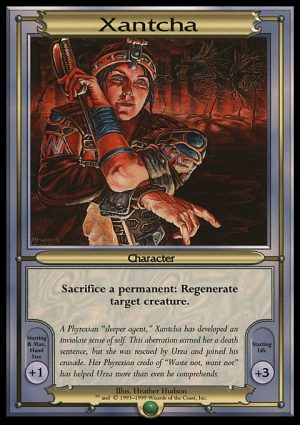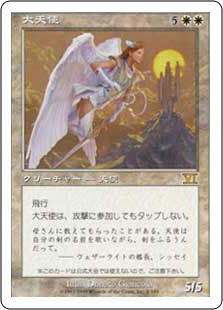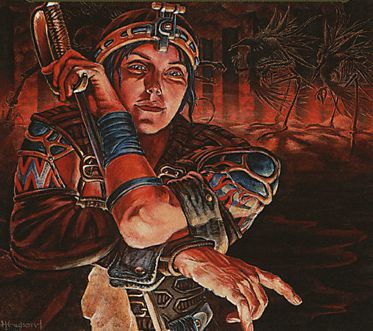Are you a Quiet Speculation member?
If not, now is a perfect time to join up! Our powerful tools, breaking-news analysis, and exclusive Discord channel will make sure you stay up to date and ahead of the curve.
Many vocal MTG speculators have stated their disgust when international arbitrage was revealed. They felt like their opportunities were being stripped away from them because many more people were suddenly aware of this approach—especially when dealing with Japanese vendors. I was one of the writers who broke this story.
Did you know, however, that there’s another form of arbitrage out there? One that doesn’t involve any international vendors, one that can be done independently without others’ assistance, and one that offers minimal risk. Do I have your attention? Good, read on to learn more.
Delving Into the Obscure
It is extremely rare to find a domestic arbitrage opportunity on any well known cards. If you think you’ll be able to pick up some Standard or Modern staples from one vendor to ship to another’s buylist for profit, you will be severely disappointed. The same goes for big ticket items such as Power, dual lands, and highly desirable Old School cards.
But if you are willing to browse through the nooks and crannies of Magic—the cards that many players don’t even know have value—then you can start to uncover some surprises. Granted, this approach isn’t guaranteed and it does require a good deal of time and effort. You can’t expect to turn over a rock and find a gem every single time. But if you find yourself bored with MTG finance during the winter holidays, when selling volume is known to dip, then this could be another avenue to supplement your income and make this hobby a little bit cheaper.
After all, it’s not everyday you find someone mention speculation on Presence of the Master from Legends. Luckily, I have done a great deal of research in this space already and have some ideas to share.
Just remember, I can’t really share specific and actionable ideas here. If I did, the opportunity would be spent by the first person to read the article. I have no interest in turning this column into an exercise of dexterity. So I’ll share some general categories along with historical examples to give you the tools and the knowledge to lead your own searches for profitable opportunities.
Unplayable Alpha and Beta Rares
If you’ve been following my writing lately, then you know I have been a loud supporter of upping investments in Alpha and Beta cards. Old School playables from these two sets have gotten very expensive, and this includes even the simplest of commons. Add onto this that the quantity of Alpha cards on TCGplayer is at an all-time low, and you have a recipe for long-term and risk-free profits.
But there’s another way to profit on Magic’s earliest two sets: by digging for arbitrage with unplayable rares. You see, no one in their mind actively seeks out stuff like Deathlace and Farmstead for play. Yet there are enough collectors out there to sustain demand for these unpalyable cards. And where there’s demand, there are vendor buy prices.
But since supply can sometimes become localized to a single vendor, you come across situations where one vendor has a handful of copies of a card in stock while others offer high buy prices due to their “out of stock” status. Vendors who use complex algorithms, and who want to keep every card in stock, will sometimes pay even higher just to get something in stock.
For example, a few months ago I browsed through Cool Stuff Inc’s entire stock of Beta cards. Turns out, they tend to have pretty competitive prices on played stuff. Since they have scans available for most noteworthy cards, it’s really easy to browse their site for arbitrage opportunities. Add on the fact that Cool Stuff Inc typically has low prices on Old School stuff to start with, and you increase your chances of making money even further.
So when I looked this particular time, I found a few deals. They had played Beta Gaea's Lieges for right around ABU Games’s buylist price. They also had a couple of Beta Timber Wolves, again near buylist. And while there was no immediate arbitrage with everything, they also had some cards listed for below eBay completed listings.
Getting that loyalty discount makes the prices even more compelling, and I have returned to this well on multiple occasions. Even if there’s no immediate cash profit to be had, I like to use this site to pick up stuff that I can buylist to ABU Games for that 50% trade-in bonus. This way if there’s a buyout and ABU Games still has copies, I can use the Cool Stuff Inc cards I have in reserve to help make the purchase, sparing my cash.
And with sites like Card Kingdom moving their buy prices on cards on an almost daily basis, there’s plenty of reason to check back in to see if any new opportunities have arisen. I find that Cool Stuff Inc adds to stock sufficiently often as well, giving me reason to visit that site regularly.
Let’s Get Even Stranger
Probably not everyone knew how expensive Beta Gaea's Liege is, but everyone at least knows that Beta exists. However there are some cards out there with good buylists from sets that most players won’t ever have heard of!
For example, you could browse the most obscure Portal cards for arbitrage opportunities. I have done this with some success before because Commander has caused some pretty strange cards from these sets to spike. We all know about the super-rare Portal: Three Kingdoms cards like Imperial Seal and Capture of Jingzhou, but how well-versed is everyone with Portal: Second Age cards?
Did you know about Norwood Priestess, which boasts a pretty strong buy price?
Or how about Razorclaw Bear, a random rare with a $5 buy price at Card Kingdom? How about the other handful of cards that buylist for over two bucks such as Steam Catapult, Predatory Nightstalker, and Righteous Fury? How many people know about all these? More importantly, how many vendors even know about these? Even major shops can overlook their prices on these cards simply because they do so little volume of sales on them.
Consider this: someone goes to a Grand Prix and sits down with a stack of cards they haven’t looked at in years. They don’t know what’s in there—they just want cash for their cards. They get to a Predatory Nightstalker and chuck it in the $1 pile. That’s what Star City Games pays on the card. They probably list the card for $3 or $4 on their site expecting the card to sit there for months before a buyer comes along.
This slow volume is your opportunity, because Card Kingdom pays very strongly on Predatory Nightstalker. So when you have some spare store credit to burn at Star City Games you can pick up however many of these they have and immediately ship them to another store for profit. Granted, for a $4 card this isn’t really going to make you a fortune. But the more you know, the more opportunities like these you can find. And they do add up!
Oversized Cards
There’s one group of cards that is even more obscure than Portal: Second Age. More random and unknown than Anthologies, Beatdown, and Battle Royale (all of which are excellent sources of arbitrage). There are the oversized cards! And there sure are a ton!
First, you have the Planechase planes. These used to be pretty stellar sources of arbitrage and Star City Games had very good buy prices on the most popular cards. But then Planechase Anthology came along and ruined this opportunity fairly extensively. I only mention it because I have used these cards to make money on in the past.
Next, you have the Archenemy Schemes: both the 2010 versions and the Nicol Bolas versions. These are far more interesting and offer a larger variety of buy prices. How often do you think vendors get these in and alter their prices? Probably not very. This becomes your opportunity. Next time you have some store credit lying around, check to see if the shop has any of these for under buylist. The same goes for when you’re shopping at an LGS or on TCGplayer.
Then you have the oversized promos—these are a treasure chest of arbitrage opportunities because different vendors care about these in varying amounts. The Avacyn Restored foil promos are very well known, but how many stores know the market price of Tazeem, the 2009 Planechase Launch promo? Or how about the oversized Hero of Bladehold? And I have personally made money flipping the oversized Serra Angel card with Rebecca Guay art. These all have a chance of being underpriced at one site or overpriced at another.
Lastly, let’s not forget the original oversized cards: Vanguard. You don’t have to know how to play with these to know that they can make you money. The more valuable ones are more well known, but again those cards in the $4 range are sometimes much cheaper at one site than another. Selenia, Urza, and Xantcha, for example, are not as well-known as the Sliver Queen Vanguard card but still have meaningful value.

Wrapping It Up
Arbitrage with international vendors has become much tougher in recent months. That’s okay; it isn’t the only arbitrage game in town. If you know where to look and are willing to do the leg work, there are plenty of domestic opportunities. Fortunately, thanks to Magic’s extensive 25-year history, there are plenty of unturned stones worth looking under.
This week I shared some areas I have browsed extensively in the past to some success. With enough research, you’ll quickly identify which vendors are favorable for which obscurities. I already identified Cool Stuff Inc as the place to shop for Alpha and Beta unplayable rares. I’m sure there are other stores with low prices on Beatdown cards, while other shops may price their Vanguard cards well below market norm. These are the tidbits that can be leveraged for modest gains.
Is it the most rewarding and glamorous way to make money in Magic? Absolutely not. I suspect many of these opportunities exist because nobody has bothered to invest the time needed to take full advantage of every bit of arbitrage out there. But during a quiet time of the year in MTG finance, this could be one avenue worth pursuing on a day off from work/school.
While it won’t make you the flashy 100%+ gains we see during a period of rampant buyouts, you still may be surprised at how much you can grind with this method. You may even learn something new.
…
Sigbits
- I was trying to sell my Ali from Cairo the other day, but I didn’t have much luck. That may not be a bad thing, though, as I see that Star City Games is paying $150 on Near Mint copies! I had assumed Card Kingdom’s buy price of $135 was best in class, but now that I see SCG is sold out of the card with a $250 price tag, I’m inclined to keep my copy for a little longer to see if this bumps even higher.
- Starter 1999 is another one of those obscure sets with hidden arbitrage opportunities. While everyone knows about Grim Tutor, some of the cheaper cards can have some pretty surprising buy prices. Card Kingdom pays quite aggressively on Devastation ($17), Coastal Piracy ($5.50), and Thunder Dragon ($3.30).
- Pop quiz: what’s the most expensive printing of Archangel? If you guessed Portal: Second Age, you would be wrong. The correct answer is actually the Gotta Magazine promo from Asia, which isn’t even tournament-legal. Yet Star City Games is sold out at $39.99! Think there’s some arbitrage opportunity with that one? Maybe!











Alpha Deathlace is collected by 1 person, so it’s a very risky card to get in on if you don’t know who that person is and what he’ll pay. You may find some random collectors of Alpha of course, but it’s super risky.
Commander is not responsible for the Imperial Seal price, that honor goes to Vintage. Of course it did at a bit to it, but the number of players willing to get Seals for their Commander decks before the reprint was incredibly low.
Of course I agree that arbitrage can be found anywhere.
Some Alpha cards to have collectors, you are right. I don’t think that’s as much the case for Beta though, right? (At least, not for Beta Deathlace).